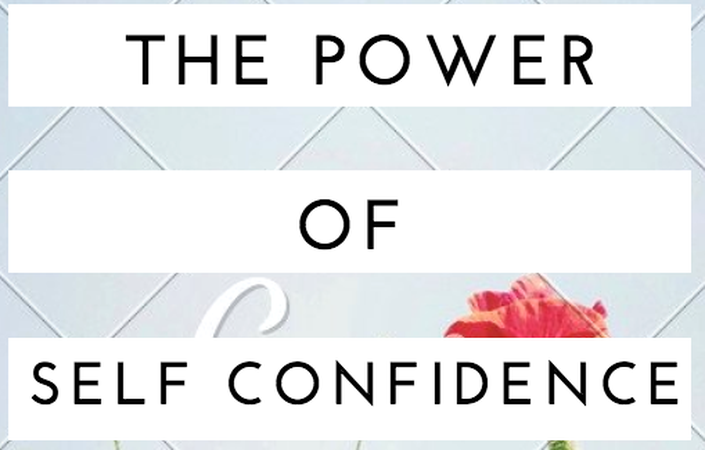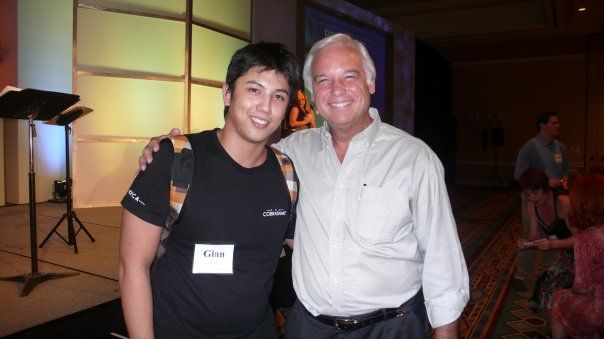
“Confidence is a resolute state of mind by which you believe nothing is impossible."
You may think of it as your inner voice – the voice that tells you whether you are good enough to do or achieve something. Self-esteem is about how we value ourselves, our perceptions and beliefs in who we are and what we are capable of. Our self-esteem can be misaligned with other people's perception of who we are.
Interestingly enough, self-esteem has little to do with actual talent or ability. It's quite possible for someone who is good at something to have poor self-esteem, while someone who struggles at a particular topic might have good self-esteem.
In the first case, the person might think “I have to give a speech tomorrow and I'm dreading it. I know I'm no good," even though they are experienced and successful. The other person may be determined to give a good speech and focuses on feeling more confident about the result, even though they display less talent than the first person.
It is easy to see how a lack of self-esteem can influence how a person behaves, not to mention what they achieve in their lives.
Do you lack confidence and self-belief?
Suffering from low confidence and self-worth can be debilitating, but the good news is that they both can be developed with the help of confidence coaching. When you start, the first thing to do is understand your current level of self-esteem. You then have a base to build upon, gradually increasing your self-worth and confidence over time until they become deeply ingrained facets of your personality.
Self-esteem and self-confidence are thought to be made up of a number of factors. These include: physical presence, social confidence, status confidence, peer independence, and stage presence. Your behaviour, your body language, how you react to different situations and how you speak can depict your confidence levels and the amount of belief you have in yourself. Confident people are typically more positive about themselves, whereas those who lack confidence often think negatively and could benefit from confidence coaching.
If you are lacking self-belief and confidence you may feel:
- uneasy and shy
- uncertain of what you want and who you are
- a sense of worthlessness
- negative thoughts about your abilities and yourself in general
- you are unable to enjoy and relax in situations that you'd like to
- as if you haven't got a sense of direction in life.
On the other hand, if you are full of self-belief and confidence you may feel:
- greater enjoyment of life in general
- comfortable when facing new challenges
- excited about new opportunities
- confident about your opinions and ideas
- a great sense of achievement
- respected by other people
- at ease in social situations
- able to be yourself
- sure of yourself and what you want.
Both self-worth and confidence can be developed through confidence coaching either by yourself or with a professional. It may, however, take some time to build upon your current confidence levels. The amount you can gain from coaching is usually very rewarding and is well worth the effort.
How can life coaching improve my confidence and self-belief?
Life coaches come equipped with the tools and techniques to help you develop your confidence and self-belief. Confidence coaching is designed to help you raise your self-image and create a positive outlook on life, starting from within. Life coaching may be able to help you challenge your beliefs that you have about yourself, boost your self-esteem and help you build a strong and positive self-image.
If you truly believe in yourself, so will others. Deeply ingrained confidence and self-worth will make life more enjoyable, exciting and satisfying.
Self-belief or self-confidence
Self-belief or self-confidence are thought to be the way that you feel about your skills, abilities, looks and behaviours. A person who has high confidence levels may learn things quickly, trust that they can complete tasks to a good standard or appear attractive to others. By definition, self-confidence means to have faith in or trust yourself.
However, confidence can also be described as the way that we project ourselves to others. We don't have to truly feel confident in our abilities, looks or capabilities in order to appear confident to others. Many people can portray an image to others of complete confidence while shaking with fear on the inside. This is a protection method used by many to cover up for a lack of self-esteem or other feelings about themselves that they would rather not acknowledge or show.
Self-worth or self-esteem
Self-worth or self-esteem describe the way that you feel about yourself regardless of your looks, achievements, or other things you may feel confident in. It is closely associated with pride in your yourself and the amount of self-respect you have. If you have high self-esteem you are typically happy in your own skin and you have a good opinion of yourself.
Self-esteem relates to the way we compare ourselves with others. This can cover a number of things such as whether we think we are as intelligent, attractive, loveable, successful or worthy as others.
Having low self-esteem can really affect your mood. Feeling that you are worth less than others may lead you to strive for perfection but never feel you have achieved enough. If you suffer with low self-worth or low self-esteem you may feel depressed, low, guilty, and you might try to prove your worth to others. You also may avoid situations that could cause anxiety or challenges you feel you cannot to cope with.
Self image
Self-image can be explained as a mixture of the self-esteem and confidence. It encompasses the impressions you have of yourself, covering things like looks, abilities, skills, sex, age, successes, career, intelligence and more. It also covers the impression you have of yourself and how you feel about yourself.
Confidence at work
Being confident at work is crucial for career success. It doesn't matter what work situation you are in - be it just starting out or running a company - confidence plays a massive part in the day-to-day activities in most occupations. Having a strong sense of self-belief can have a massive impact on your effectiveness and enjoyment in your job. It also affects how we communicate with friends and colleagues.
Being confident in the workplace enables you to be situationally proactive, assertive and focused. Having true confidence not only allows you to have a positive impact at work, it also helps you make choices that will benefit your home life too.
Here are a number of areas that a life coach could cover with you if you are struggling with confidence at work:
- leadership coaching
- management coaching
- small business coaching
- conflict resolution
- public speaking
- anger management
- stress management
- executive coaching.
If you distinctly lack confidence at work more than other areas of life and do not believe you warrant the success you have achieved, you might have imposter syndrome.
Imposter syndrome
Imposter syndrome is when you cannot seem to internalise your accomplishments. The persistent feeling of inadequacy may haunt you, even though there is definitive proof that your achievements are the result of hard work and talent. You may experience feelings of intellectual fraudulence and severe self-doubt.
You will feel like you are aren't a competent, successful individual, you are instead imposing as such. 'Imposter' feelings can come in many forms, but they tend to fit in the following three categories:
Feeling like a fake
You may feel like you have deceived others into thinking that you are more competent that you are. You don't think you deserve your professional position or success. This is typically coupled with the fear of being 'found out'.
Statements that you may identify with:
- “I am afraid of the time when my colleagues discover my lack of professional knowledge."
- “I often come across as a more competent person than I actually am."
Your success is attributed to luck
You may have a tendency to feel all of your success is down to luck or another external variable, rather than your skills and perseverance.
Statements that you may identify with:
- “This won't happen again."
- “I just got lucky."
- “This was a total fluke."
Downplaying success
Oftentimes when you achieve things that others congratulate you for, you will discount your own success. You may feel that the achievement itself could have been accomplished by anyone.
Statements that you may identify with:
- “It's not that big of a deal."
- “It wasn't that important."
- “The reason I did so well was because it was an easy task."
The imposter syndrome is not an 'all or nothing' type of mentality. You may only identify some of the feelings in certain situations, or you may know friends or colleagues that exhibit some of these traits.
If you have imposter feelings, you can take positive steps towards changing them. A life coach can offer help and the motivation to get your professional life back on track.
The benefits of a positive mental attitude
There are plenty of ways to improve your self-confidence. Some may work better for you than others. Yet the main thing to remember is that you need to truly believe in yourself in order to start making the changes you strive for. If you lead with positive thoughts then you are more likely to accomplish your goals. This can be seen in medical miracles, successful sports people and in children who are usually more open about their self-belief.
Most improvement techniques for self-confidence are based around the power of the mind and body to work together in order to achieve the results you are looking for. A positive mental attitude will help you overcome many obstacles by enabling you to do things with the incredible power of your mind.
In contrast, a negative attitude will create negative actions feelings, results and low confidence levels.
The beauty of any technique based on a positive mental attitude is that you don't need to know the outcome of an action in order to be able to do it, you simply need to believe you can do it and your body will loyally follow. This may not always happen straight away and will take a lot of practise but is a proven technique that can produce results.
"Whether you think you can or you can't, you're probably right." - Henry Ford
Building Self-Confidence
No matter what your self-confidence level is right now, you can probably improve it. But you need to believe in yourself and your capabilities before anyone else will.
Bandura's theory of self-efficacy is a great place to start looking for ways to improve the way you see your abilities. According to the theory, there are four sources of self-efficacy:
- Mastery experiences – things you have succeeded at in the past.
- Vicarious experiences – seeing people who are similar to you succeed.
- Social persuasion – hearing from others that you're capable.
- Emotional status – staying positive, and managing stress.
Three of these sources (the first, second, and fourth) are within your control, so we'll look at them more closely. However, while we can't force people to say good things about us (the third source), we can increase the likelihood of receiving positive feedback by being more confident in general.
Click Here to Subscribe to my newsletter
Your Instructor

Hi Im Jon Herrera
Im a business coach and also a serial entrepreneur. My mission is to help people and teach them how to create more Health Wealth and Love and Happiness. I am 34 now married to my wife and best friend. My purpose and mission is to help as many people I can through my knowledge in online courses and coaching. I travel most of the time and I designed my life and career by helping people and the Universe has treated me well. Everything I am teaching now is something I wish I learned when I was 18.
Steve Aoki

Lisa Nichols "The Secret"

CEO of Mindvalley Vishen Lakhiani

Jack Canfield

My Wifey and Bestie Patti
Course Curriculum
-
PreviewIntroduction To Belief Hackers (5:06)
-
StartAre you the ONE? (3:07)
-
StartRyan Gosling needs to know? (4:22)
-
StartWords that Create (6:15)
-
StartParadigm "Gucci" Shades (6:56)
-
StartThe Bully's Bully
-
StartVideo Appreciate (5:22)
-
StartThe Vortex (10:14)
-
StartWhat do you want now? Feeling is Believing? (9:32)
-
StartThe Power of Forgiveness (5:14)
-
StartGratitude Experiment (4:14)
-
StartHow to know your Life Purpose in 5 minutes ? (6:31)
-
StartCreate the Vison. Give your gift away (9:46)
-
StartThank You (1:32)
Courses Included with Purchase


Original Price: $200
Frequently Asked Questions
This is only the begining not the end
I am grateful for having you as students, I would love your testimonials and feedback and would love to get feedback and how this can help someone in your life.
please tell people why this would be the best investment for them.